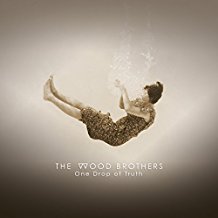
Like the finest blues and country music of the past, the songs of The Wood Brothers contain something of a rarity in these modern times: perspective. There is a palpable point of view in each of the ten tracks that reaches for an emotional core still alive and burning in the soul. At a moment in history when the collision of fact and fiction seems to be numbing us to either, One Drop of Truth arrives to remind of the humanity behind the divisions.
From the opening “River Takes the Town”- a tale of an anonymous town victimized by flooding that cuts so effectively as a metaphor for loss- through the final “Can’t Look Away,” and its provocative mini-vignettes, these lasting melodies and messages move the heart, the head, and the feet. There is the groovy “Happiness Jones” that questions prosperity, offering the notion that nothing is learned from being happy. There is “Laughin’ or Crying” that plays like dance music for the undead; with its clip-clopping rhythm, embellishments of foreboding keyboard, and reverberating guitar singing behind the beat. There is the atmospheric bowed bass of Chris Wood that shades “Strange as it Seems,” while brother Oliver’s bottleneck slide guitar and Jano Rix’s percussive kitchen transport “Sky High” to a shuffle down a Mississippi sidewalk for an afternoon jam. Self-produced by the three, there are many echoes of genuine collaboration throughout, like Chris’ pair of lead vocals- “Seasick Emotions,” and the blues of the title track- while Rix and Oliver shadow in harmony. The Wood Brothers exemplify equality, as each instrument, each vocal serve the song’s intent while every performance sparkles with exceptional musicianship.
There is still a need for real, articulated thoughts and stories about the heartache and the fun of life to help us heal and to help us celebrate. This is not a political album per se, but it does make a few subtle statements about our collective feelings, yearnings, and pain. Yet, the beauty is that even in this poetic and stimulating set brimming with observation and cope there is room, too, for the simple notion of inebriation driven by a funky clavinet in the party tune, “Sparkling Wine.”
All of it comes without a hint of indulgence, excess, or haughtiness; rather this is a record that’s humble, economical, and direct. But, this does lead to a dilemma. When, on “This is It,” Oliver asks why he tries to change the world when all he needs is some love, the romantic in us hopes he finds it, while another part of us wants him to keep trying to change the world. Especially if it means more music like this.



No Comments comments associated with this post